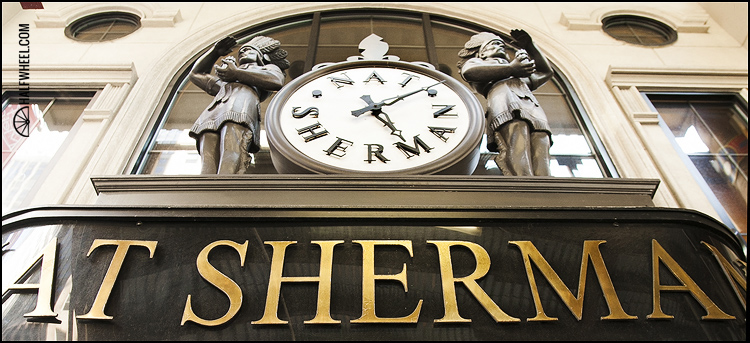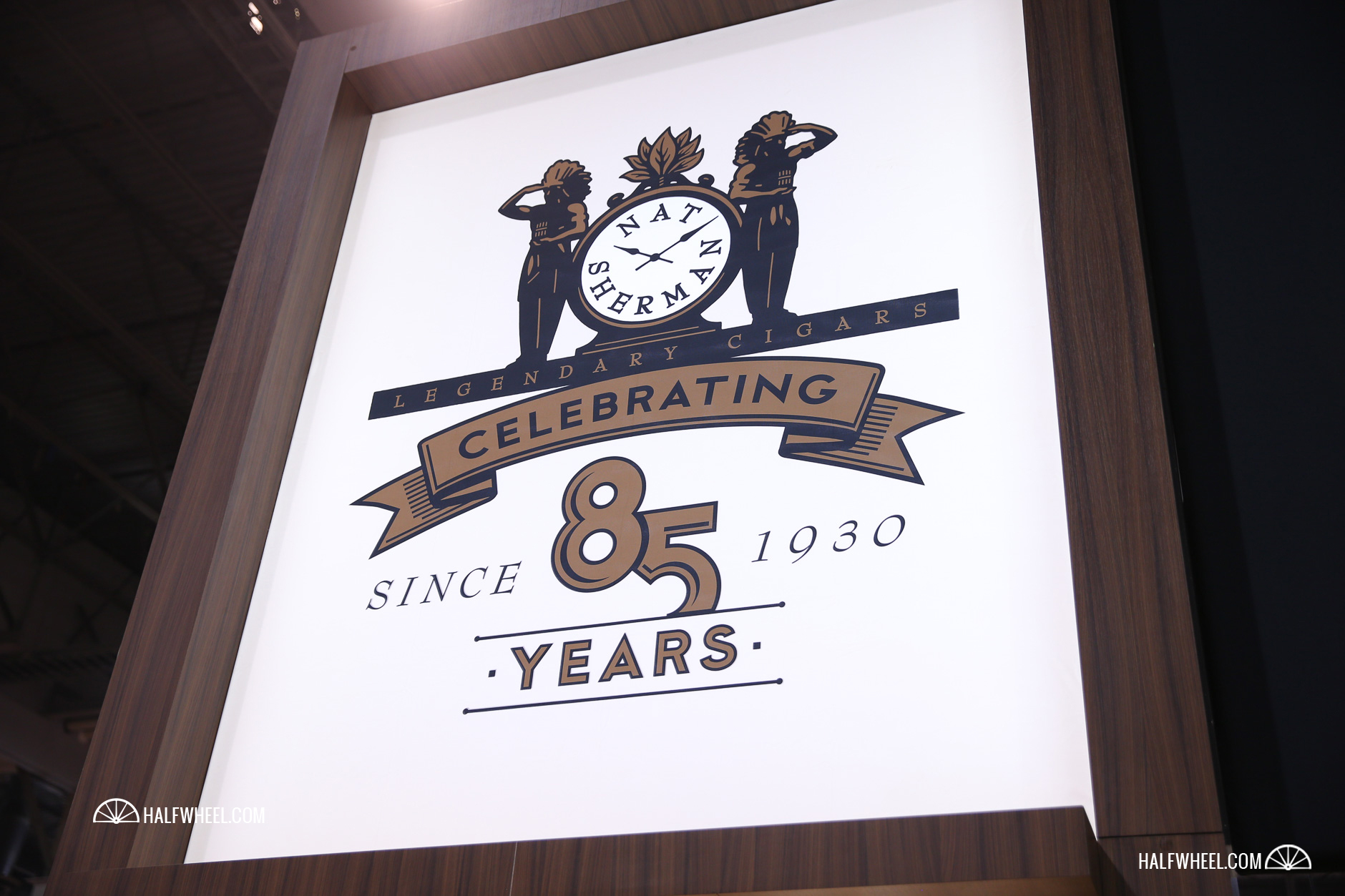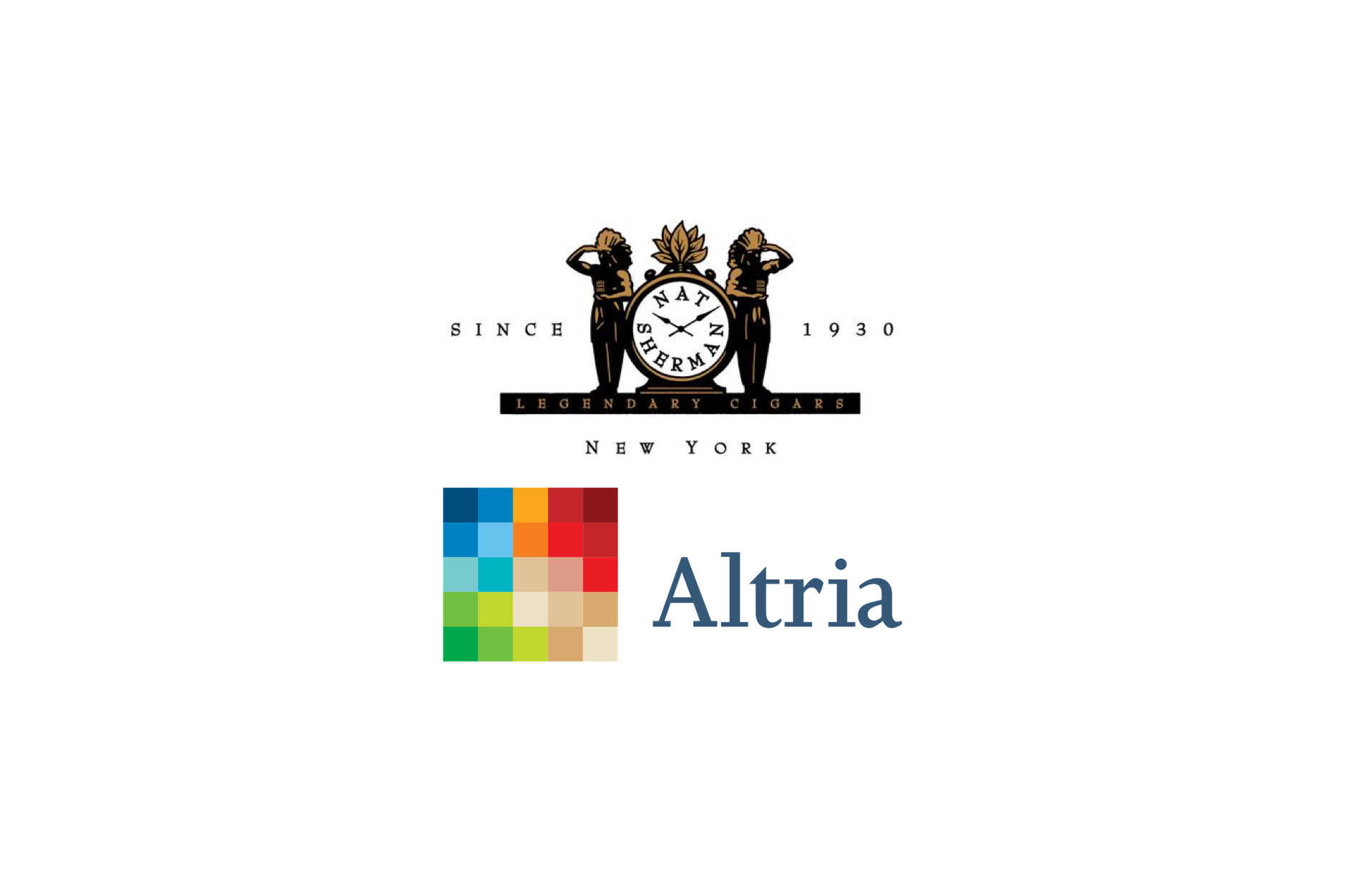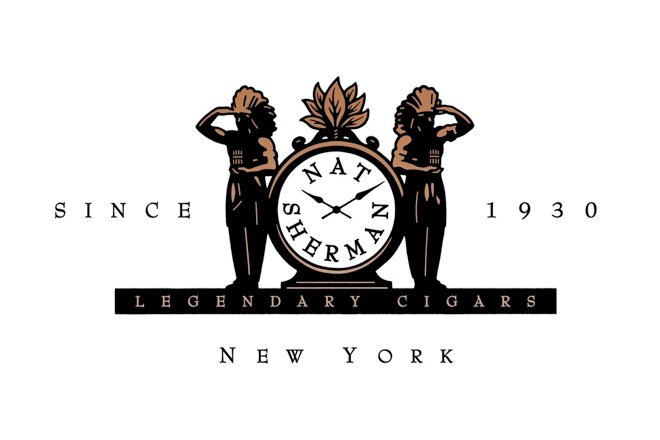When I was growing up, my father’s humidor was a Nat Sherman humidor. The small thing that he bought in the 1980s could probably store no more than 15 Churchill-sized cigars. It sat on the shelf of my childhood home for a decade filled with a couple of crumbling cigars, a small cutter, a $1 bill from the time someone tried robbing him while he worked at a Taco Bell and a few other mementos.
Nat Sherman always held a special place in his heart.
I know that when we talk this week he will bring today’s news up. (He will also probably mention that he saw the headline but will neglect reading the article, so he’ll have no idea he got 100+ words devoted to him.)
In case you missed it, Nat Sherman is closing its cigar and retail business next month. Nat Sherman, the self-proclaimed tobacconist to the world. Nat Sherman, the company whose retail store was called The Townhouse. Nat Sherman, the company that where so many parent bought cigars, where so many of their kids bought cigars. Nat Sherman, a 90-year-old American cigar company, is closing.
Had my father and I known that this day was sooner rather than later, we probably would have stopped in a couple of Decembers ago when we were both in New York City for a very cold weekend. He would have appreciated the nostalgia. He probably would have misremembered that this wasn’t the store he once shopped at in the 1980s; the store changed locations in 2007. He would have talked about how much around the store has changed. He would have been right, sort of. He would have shopped at the old location when he was my age; we both could have shopped at the store’s current location at the same time.
As much as some of you would enjoy the nostalgia and stories about my father, that is not why you came here. So here they are, some thoughts about how we got here, one question for the future and a goodbye to Nat Sherman.

1. HOW WE GOT HERE, PART I (ALTRIA)
Many years ago—probably around 2011—I was talking to a longtime sales representative for CAO. We were talking about what was going on at CAO at the moment in time, as General Cigar Co. had just taken over the brand. CAO looked lost. Fans of the brand and retailers were upset.
He told me that CAO didn’t die when the company’s Nashville headquarters was shut down in the summer of 2010. It didn’t die when its salesforce was disbanded around that time and largely moved to Toraño. Rather, he said that it died in late 2006 and he described what that moment looked like.
Cano Ozgener, CAO’s founder, had gotten a diagnosis that he once again had cancer. Ozgener decided that it was the time to sell and in January 2007 he accepted an offer from Skandinavisk Holding A/S, which would eventually become STG.
CAO got a temporary reprieve. For the better part of three years, its staff—including Cano’s son, Tim—remained and it was largely left alone by its new European owners. In 2009, a merger took place between Skandinavisk Holding A/S and Swedish Match, which owned General Cigar Co. It was decided that the two premium cigar units would become one and CAO would be absorbed into General in the fall of 2010.
I say all that because while the last day of the Nat Sherman Townhouse will be sometime in the next 50 days or so, the moment the end arrived was Jan. 17, 2017. That was the day that Altria bought Nat Sherman from the Sherman family.
Altria is BIG tobacco. It’s the company behind Marlboro, Black & Mild, Copenhagen and Skoal; it also has a large stake in Juul. It’s the preeminent tobacco company in the U.S. with a market capitalization of $77.31 billion. (It was around $135 billion when Altria bought Nat Sherman.) But that .31 is an important part of this. It’s $310 million. It could be more than what Altria paid for Nat Sherman. Maybe it’s not. But the fact that a rounding error of the company’s valuation could be more than what all of Nat Sherman is worth says all you need to know.
Today’s announcement is just the end of Nat Sherman as a premium cigar and pipe business. The natural leaf cigarettes—which is widely believed to be why Altria acquired Nat Sherman—will remain, though the company is showing less interest in some of the other Nat Sherman cigarette brands.
Chances are if you are in both the cigarette and premium cigar business, the former is where you make your money. Imperial Brands, plc—a large British multinational tobacco company—is in both but has agreed to sell its premium cigar division. British American Tobacco—an Altria and Imperial competitor—was in both, sort of. BAT owns the rights to Dunhill’s tobacco properties and eventually decided it just wasn’t worth it and just shut down the cigar brand altogether.

2. JUST BECAUSE SOMETHING IS PROFITABLE DOESN’T MAKE IT WORTH IT
So many people—some of who will just skim over this section—will blame this on the brutal capitalism at Altria. (Side-bar: I look forward to some of you defending socialism as an economic system in our comments section.) Some will blame the “bean counters.” Others will say, “big tobacco just hates cigars.”
That’s not why things are being shut down.
First of all, if Altria hated the cigar business, it would have shut it down in early 2017. It certainly wouldn’t have been surprising if it did it in August 2017. Furthermore, the company not only spent money to keep running the premium cigar business, but it also invested heavily in rebranding the products. None of that would make much sense if Altria hated the cigar business.
The issue is that at a company the size of Altria, there are limits about what divisions you will operate, even if they are profitable. When you’re as big as Altria, sometimes profits aren’t enough because it’s just not worth the time and the risks.
Altria is okay with having businesses outside of its core revenue driver. For example, it owns two wineries. But wine is not tobacco, and tobacco—particularly if you are at Altria—is highly regulated.
I suspect that the reason why Altria decided to exit the premium cigar business is because of what might happen, not what happened during its ownership. It’s just the risk. The risk that there’s a lawsuit regarding premium cigars is filed, the risk that someone in the premium cigar division violates the Master Settle Agreement, the risk that an underage person gets caught buying cigars at the Nat Sherman Townhouse. The risk that New York City bans smoking in cigar shops.
None of that, even the smallest of issues, makes it worth whatever tiny percentage premium cigars contributed to Altria’s $25.11 billion in revenue last year. If it was, this article wouldn’t be written because Altria might be in the tobacco business, but it’s really in the business of making money and today’s move didn’t make the company a dime.
3. HOW WE GOT HERE, PART II (CORONAVIRUS)
I was a bit surprised last October when Altria said it was willing to sell the premium cigar business and publicly put a for sale sign on it.
Surely it wasn’t about the money for Altria. Yes, the company wasn’t going to take below market value for the property, but it also wasn’t the same situation at Imperial: Altria doesn’t need the profits from a sale. Quite clearly, it doesn’t need the profits given today’s announcement to just shut it down.
At the time I said it was “a good deed by Altria” and “a massive win for Nat Sherman International employees and anyone that enjoys the brand’s cigars or retail operation.”
I do think it’s worth pointing out what happens if Altria hasn’t sold Nat Sherman International in a year. Just because it is willing to consider a sale now doesn’t mean it will always be on the table.
A part of me wondered why Altria was willing to go down this road as opposed to just doing what BAT did with Dunhill and shutting down an irrelevant part of a company’s bottom line. I still don’t know the answer. I suspect it’s some combination of: “hey, free money for a property we will shut down anyways,” Michael Herklots et al. lobbying, and that the people that run cigarette companies are generally fans of tobacco. Like, ardent fans of tobacco.
As someone that went to college in a town largely built by R.J. Reynolds, I can tell you that “pride in tobacco” isn’t just a slogan. A lot of people won’t work for a cigarette company, particularly the people that are qualified to be a high-level executive at a multi-billion dollar corporation, so the people that do end up there are oftentimes staunch defenders of tobacco and tobacco companies. They talk about the good ‘ole days, even if they weren’t there. And they are loyal. Altria’s outgoing ceo and chairman spent 28 years at Altria. The new ceo has been there for 25 years. The guy that’s taking the new ceo’s old job has been there for 29 years.
Altria might have been serious about selling Nat Sherman International, but it certainly wasn’t desperate to get a deal done. If anything, it seems like the company was okay with letting the cigar division find a new home, but probably not for the $1 some of you are willing to offer today.
I’m told that there were actually negotiations—something that I wasn’t quite sure would happen—and from what I understand it might have been close. But then, like everything else in 2020—the coronavirus COVID-19 pandemic reared its ugly head.

4. NAT SHERMAN INTERNATIONAL’S BUSINESSES ARE PROBABLY WORTH LESS THAN WHAT ALTRIA PAID FOR IT
I think both parts of Nat Sherman International—the retail store and the wholesale cigar business—were likely worth more a few years ago.
Most people seem to think that Nat Sherman owned the building that houses the retail store. That is not true; the building is leased. I’ve been told before that the lease expires in early 2021, though Michael Herklots declined to comment on that.
If it was true that the company owned the building, who knows if I’m writing this article now. I think it’s probably a coin-flip. Maybe Altria would have shut it down in 2017 and just sold the building for profit; maybe it would have been able to find a buyer in 2020.
But, it doesn’t own the building, and with the lease expiring in the first half of next year, New York City being ravaged by the coronavirus pandemic, no real timeline for when the city might be back to “normal” and a likely doubling of taxes on cigars in the state: the Nat Sherman Townhouse isn’t worth as much as it was a year ago, let alone five years ago. The other major issue is that because of New York City’s restrictions on tobacco licenses, moving to a new location isn’t as easy as it would be in most cities.
As for the other part of the business—the wholesale division that sells cigars, pipes and accessories—I’m not really sure how much it’s worth. The major issue isn’t the cigars themselves, it’s that whoever bought the rights to the brands seemingly wouldn’t be able to use the Nat Sherman name given that the company had already rebranded all of its products to remove the Nat Sherman name. Nat Sherman Epoca might be worth something, but Epoca by itself is inevitably worth a lot less.

5. WHERE DOES MICHAEL HERKLOTS GO?
I have said it before on this website, the best way to measure something is based on how it is judged by its peers.
There are few people in the premium cigar business who are respected as much as Michael Herklots. I also imagine there’s no one younger than Herklots who commands as much respect as he does.
Herklots started his career in Boston at The Humidor before heading to Gloucester Street Cigar Co. He became well-known for his tenure working at Davidoff’s New York City retail stores, eventually becoming the person in charge of both of them. He’s a person that is a regular keynote speaker at most cigar conferences; he’s someone that gets profiled in non-cigar publications; he’s someone that hangs out with celebrity chefs; but most importantly, he’s someone that’s respected by seemingly everyone in this business.
I have no idea where Herklots might end up, but it’s clearly the biggest question coming out of today’s news. I suspect that Herklots will receive plenty of interest from a variety of cigar companies. I also suspect that Herklots could find a job in plenty of other industries, particularly if they are at the intersection of luxury and men’s products.
I do know that if I was asked to find someone in the cigar industry who could lead the Premium Cigar Association—in any capacity—Michael Herklots would be the best option for a unifying, respected figure. Whether or not that mess is a good thing for Michael Herklots is a different story.

6. THE 2018 ALTRIA LETTER
Nat Sherman, a 90-year-old name in the cigar business, will leave the cigar industry with a battered reputation. And it’s just so wrong.
Some clown commented, “Good” on our news story.
First of all, if you are commenting “Good” when multiple people are losing their jobs because a company is getting shut down, you better take a long, hard look in the mirror. Sometimes it’s acceptable, some companies do evil things. But why is this a good thing? What evil did Nat Sherman bring into the world? What is so good about this announcement that it possibly outweighs multiple people losing their jobs?
If you are unaware of why this could even be possible, it stems from a 2018 article by Cigar Aficionado. At that time the U.S. Food & Drug Administration (FDA) was asking the public and companies to comment about whether the agency should consider exempting premium cigars from regulations. It was another round of a song and dance where the agency seems publicly non-committal about wanting to regulate premium cigars while also regulating premium cigars.
Altria’s position was that premium cigars should not be exempted from all regulation, but should receive modified regulations in relation to other tobacco products. It argued those points in a letter written by the company’s vp of regulatory affairs, Jose Luis Murillo.
The premium cigar industry was obviously wanting to get a full exemption and many, including Marvin Shanken—Cigar Aficionado’s founder—publicly took issue with Altria’s stance.
There are many issues with what the commentary that ensued and continues to—literally—this day, but the entire discussion was so far removed from reality that it still boggles my mind. I wrote an article about this at the time and the wrong stance that I think many in the premium cigar business had on Altria’s position.
If you need any indication about just how wrong that stance is and was: last month, Michael Edney–the attorney representing Cigar Rights of America and the Premium Cigar Association in its lawsuit against FDA—argued for both full exemption and modified regulations.
Clearly, very few people read the letter. It was not leaving the cigar industry out to dry. In fact, it was arguing for less regulation than existed at that time. Less regulation than exists now.
The letter argued for the following:
- FDA should create different rules for “premium cigars.”
- A cigar should be considered premium only if it uses a whole leaf wrapper, 100 percent tobacco binder and filler, is rolled by hand except for a manually operated machine to bunch, is not flavored and weighs at least six pounds per 1,000.
- FDA should not define “premium cigars” based on price.
- Premium cigar makers should have to register which factories produce its cigars and submit an ingredient list.
- FDA should develop a unique product approval for premium cigars that is less burdensome than the substantial equivalence process.
- FDA should require “appropriate” warning labels for premium cigars. (Note: a court has thrown out the requirement for warning labels for all cigars.)
- Premium cigars should not be sold in places where people under the age of 18 are allowed to enter.
- FDA should not require HPHC testing for premium cigars.
- “FDA Regulation of Cigars Must Be Predictable and Fair” — that’s a direct quote.
- FDA has not proven that there are reliable testing methods for premium cigars.
These are arguments that the cigar industry—not just its attorneys—routinely makes. Furthermore, that list of proposed regulations would be one that most cigar companies would accept today in a heartbeat. In fact, I think most of them would have accepted them in 2018. After all, the fabled exemption is still that, a fable.
Of course, none of that mattered.
People read a headline, or maybe they read Cigar Aficionado’s article, or maybe just someone yelling on Facebook.
They failed to take into account that no company knows how to successfully deal with American tobacco regulation like Altria. They failed to consider that the letter was from a compliance person at Altria, not the employees at the store some people vowed to never visit again. They failed to consider that Altria’s 2018 position was substantially more cigar-friendly than its 2014 position on the matter.
And seemingly no one took into account that Altria—in this particular instance—wasn’t making the cigar world a worse place.
Yes, it wasn’t arguing for something as good as an exemption but it was still a lot better than the status quo. It wasn’t even arguing to level the playing field between the stricter rules that its premium cigar company has to abide by versus others. Because of cigarette regulations that apply to the entire brand, Nat Sherman was forced to shut down its social media accounts, rebrand products and place warning labels on everything, including hats and matches.
Even if you thought that it was trying to level the playing field or make things worse, and even if you vehemently disagree with my arguments on the matter; those were the sins of Altria, not of Nat Sherman, the company; not of the family that owned the business for over 85 years; and not of any of the employees who will lose their jobs next month.
Nat Sherman—the tobacconist to the world—didn’t deserve to go out like this.
Capitalism is a brutal system in which numbers prevail above people, and in this particular instance, the numbers weren’t in Nat Sherman’s favor. But Nat Sherman and its people deserved a much more graceful exit than some clown on Facebook saying, “Good.”



